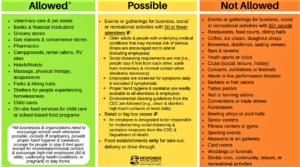Dr. Chris Spitters, health officer for the Snohomish Health District, issued a local Health Officer Order for Snohomish County today that parallels Governor Jay Inslee’s proclamations on March 16, 2020.
The new order prohibits all events or public venue gatherings of 50 or greater attendees until further notice. Events or public venue gatherings with fewer than 50 attendees are prohibited unless event organizers take all of the following steps to mitigate and minimize risk:
Older adults and individuals with underlying medical conditions that may increase the risk of serious COVID-19 are encouraged not to attend (including employees); and
Social distancing recommendations must be met (i.e., people staying 6 feet from each other, aside from momentary and minimal contact at closer distances only when absolutely necessary);
Employees must be screened for coronavirus symptoms each day and excluded if symptomatic; and
Proper hand hygiene and sanitation must be readily available to all attendees and employees; and
Environmental cleaning guidelines from the U.S. Centers for Disease Control and Prevention (CDC) are followed (e.g., clean and disinfect high-touch surfaces daily or more frequently).
If a business or event organizer cannot ensure that all requirements are met, then they must modify, close, cancel or postpone until the prohibitions are lifted.
Also prohibited are the operations of public venues where people congregate for entertainment, social or recreational purposes, including but not limited to bowling alleys, gymnasiums, fitness centers, athletic clubs, card rooms, barbershops and hair/nail salons, tattoo parlors, pool halls, and other similar venues.
Furthermore, the onsite consumption of food and/or beverages is prohibited in any public venue, including but not limited to, the following venues, through 11:59 p.m. on March 31, 2020, unless extended beyond that date by subsequent order:
Restaurants
Food courts
Bars
Taverns
Coffee shops
Catered events
Clubs
Bowling alleys
All other similar venues in which people congregate for the consumption of food or beverages.
This order does not prohibit the sale of prepared food or beverages that are otherwise legally delivered or taken out of the venue for consumption of the purchasing of groceries that are not consumed within the premises, more commonly known as drive-through, take-out, and delivery services.
Exempt from the order are food service operations in health care settings, schools and educational settings; and shelters for people experiencing homelessness. However, these exempted groups should make reasonable efforts to ensure social distancing when providing food service.
Some food establishments have asked what they can do with remaining food if they choose to close instead of providing takeout or delivery services. Food establishments are reminded that food donation is a great way to help feed members of their community in times of crisis. The Washington State Department of Health has developed food rescue guidance to help with that process.
 The Snohomish Health District has developed a graphic to decipher what is currently allowable and not, as of March 17. We encourage businesses and employers to visit our resources available online. We also have different posters available to download that you can post on doors or windows.
The Snohomish Health District has developed a graphic to decipher what is currently allowable and not, as of March 17. We encourage businesses and employers to visit our resources available online. We also have different posters available to download that you can post on doors or windows.
Regarding child cares
At this time, child cares have not been advised or required to close. The Snohomish Health District is strongly encouraging parents and guardians who can keep their children home at this time to do so. Child care providers are being encouraged to talk to families about the possibility of long-term closures and to make plans for their business.
With schools and businesses closed, it is crucial that child care is prioritized for those who cannot work from home or stay home from work for an extended period of time. Keeping children at home, hiring a nanny or babysitter to provide one-to-one care, or sharing care responsibilities with other parents in groups of no more than two or three children will help reduce the risk of spreading this disease.
If a portion of families can keep their children at home, it also reduces the group size in child care settings, which minimizes the potential for exposure. Minimizing the risk of exposure in child care plays an essential role in keeping our first responders and health care providers healthy, as well.
As for why child cares are open, class sizes in child cares tend to be relatively small and child care facilities are generally smaller than schools. Child cares also play a crucial role in ensuring that those who cannot work remotely still have a safe place for their children. Many people who are critical to this pandemic response – including first responders, dispatchers, and health care workers – are not able to work remotely.
However, child care providers must be able to meet health and safety requirements. A few highlights of those requirements are: excluding sick employees from work; sending sick children home; meeting all CDC recommended cleaning and disinfecting procedures; and ensuring proper hand hygiene and sanitation are readily available to all children and staff.
Child care providers also may make individual decisions to close due to staffing or health issues, or they may need to close if a staff member or child becomes ill with COVID-19. They also should look at closing temporarily if they cannot staff their child care without employees who are part of a high-risk group, which includes people who are 60 or older, people who have underlying medical conditions or weakened immune systems, and pregnant women.
Social distancing (maintaining at least 6 feet of space aside from momentary or minimal contact) is not realistic in large groups of young children. Smaller groups reduce the risk of spreading illness and make it more manageable for child care providers to keep up with health needs like monitoring for symptoms, encouraging children not to touch their own or each others’ hands and faces, and frequent cleaning and sanitizing of surfaces and objects.




March 17, 2020
Everett